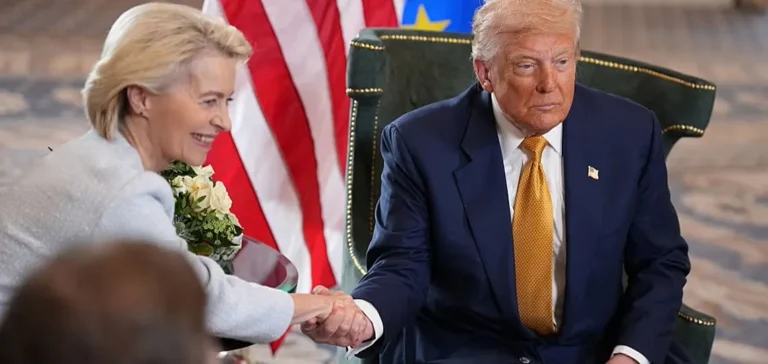Trade negotiations between the United States and the European Union have resulted in a compromise imposing a uniform 15% tariff on most European goods entering the American market. The agreement, announced after a meeting between US President Donald Trump and European Commission President Ursula von der Leyen, aims to defuse escalating trade tensions.
Massive energy investments over three years
As part of this agreement, Brussels has committed to purchase, over a three-year period, $750mn worth of US hydrocarbons, nuclear fuels, and semiconductors, including liquefied natural gas. The European Union is also planning direct investments totalling $600mn in the United States, including the acquisition of military equipment. These transactions come in addition to the removal of tariffs for certain strategic sectors, such as aeronautics, specific chemicals, semiconductor equipment, and some agricultural products.
The new 15% tariff remains higher than the 10% rate granted to the United Kingdom in a previous deal. This disparity creates a differentiated trade environment across Europe, particularly notable on the island of Ireland, where Northern Ireland benefits from a more favourable rate due to the UK agreement.
Mixed reactions and industrial impact
In Germany, the government welcomed the agreement for preventing an escalation that could have severely affected the export-driven economy, particularly the automotive industry. However, several German industrial federations expressed concern over the expected negative impact of the new tariff schedule, with the chemical sector citing rates still too high and car manufacturers already noting an impact on financial results, as seen with Volkswagen estimating a €1.3bn ($1.5bn) loss in the first half of the year.
The structure of the compromise leaves certain details unresolved, especially regarding the French and Dutch wine and spirits sectors, for which no clear exemption has been obtained. The 50% tariffs on steel and aluminium, already in effect, remain unchanged pending possible development towards a quota system, subject to further negotiations.
Outlook and uncertainties for transatlantic trade
The scope of this agreement, described as a provisional framework, leaves room for future adjustments, with the American presidency reserving the right to increase tariffs if European investment commitments are not met. Several analysts have noted that the text does not provide definitive written guarantees, maintaining a degree of uncertainty for operators in the energy and industrial sectors.
The trade balance between the United States and the European Union, which amounted to approximately $976mn in goods exchanges in 2024, will continue to be closely monitored. The United States expects tariff revenues of about $90mn based on last year’s import flows, while European companies will need to factor this new cost into their export strategies.






















